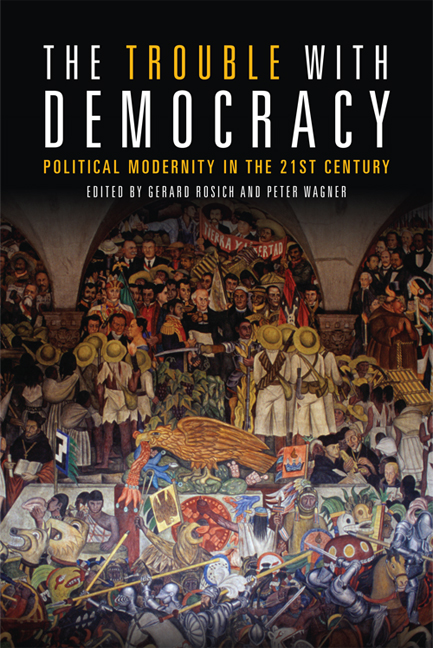Book contents
- Frontmatter
- Contents
- Acknowledgements
- List of Contributors
- 1 Introduction: Re-Interpreting Democracy for Our Time
- 2 Autonomy in and between Polities: Democracy and the Need for Collective Political Selves
- 3 Rethinking ‘Modern’ Democracy: Political Modernity and Constituent Power
- 4 Democratic Surplus and Democracy-in-Failing: On Ancient and Modern Self-Cancellation of Democracy
- 5 Setbacks of Women's Emancipation (Condition, Consequence, Measure and Ruse)
- 6 Political Modernity, Democracy and State–Society Relations in Latin America: A New Socio-Historical Problématique?
- 7 Communitarian Cosmopolitanism: Argentina's Recuperated Factories, Neoliberal Globalisation and Democratic Citizenship. An Arendtian Perspective
- 8 Middle-Classing in Roodepoort: Unexpected Sites of Post-Apartheid ‘Community’
- 9 Democracy and Capitalism in Europe, Brazil and South Africa
- 10 From Realism to Activism: A Critique of Resignation in Political Theory
- 11 The World as We Find It: A Suggestion for a Democratic Theory for Our Times
- 12 Epilogue: Democracy as Capacity for Self-Transformation
- Index
11 - The World as We Find It: A Suggestion for a Democratic Theory for Our Times
Published online by Cambridge University Press: 05 September 2016
- Frontmatter
- Contents
- Acknowledgements
- List of Contributors
- 1 Introduction: Re-Interpreting Democracy for Our Time
- 2 Autonomy in and between Polities: Democracy and the Need for Collective Political Selves
- 3 Rethinking ‘Modern’ Democracy: Political Modernity and Constituent Power
- 4 Democratic Surplus and Democracy-in-Failing: On Ancient and Modern Self-Cancellation of Democracy
- 5 Setbacks of Women's Emancipation (Condition, Consequence, Measure and Ruse)
- 6 Political Modernity, Democracy and State–Society Relations in Latin America: A New Socio-Historical Problématique?
- 7 Communitarian Cosmopolitanism: Argentina's Recuperated Factories, Neoliberal Globalisation and Democratic Citizenship. An Arendtian Perspective
- 8 Middle-Classing in Roodepoort: Unexpected Sites of Post-Apartheid ‘Community’
- 9 Democracy and Capitalism in Europe, Brazil and South Africa
- 10 From Realism to Activism: A Critique of Resignation in Political Theory
- 11 The World as We Find It: A Suggestion for a Democratic Theory for Our Times
- 12 Epilogue: Democracy as Capacity for Self-Transformation
- Index
Summary
Wo aber Gefahr ist, wächst
Das Rettende auch.
HölderlinWe are concerned with the prospects for democracy under the conditions of modernity: two words that need not so much definition as exploration.
When in 1950 Hannah Arendt visited Martin Heidegger for the first time after the Second World War, they went for long walks and she sought to engage him in conversation as to how one was to think of the events that had transpired since their last encounter in 1934. Her early book The Origins of Totalitarianism and the later The Human Condition were her most extended attempts to come to grips with this new world (although one should mention Eichmann in Jerusalem here as well).
This is our problem also – at least one of our problems – if democracy is the activity of a people coming together to deal with what they have in common; that is my first attempt at an exploration. I take it that any theory of democracy must determine an appropriate democratic response to the particular set of problems that confront a given people (or peoples) at a particular time. These problems vary importantly, and what one thinks are the predominant problems of the time may be different from what they in fact are. Identification of the nature of particular problems is thus the first and most important step. As an example: if one understands the problem connected to the practice of segregation in the USA in the first two-thirds of the past century as a problem of civil rights, one will tend to think the appropriate response to be the achievement of voting rights. Such, I might note, was the conclusion of Robert Dahl in his 1956 A Preface to Democratic Theory. If one understands segregation as a problem of ressentiment, the achievement of one's identity by the negation of another's, a democratic response requires something additional.
I cannot here given more than an indication of what I think the most important problems that shape this world are. Partly out of lack of adequate knowledge of some of the parts of the world that are of concern to this volume, but more significantly out of the conviction that different peoples have different problems, I am going to restrict myself to the Anglo-American-European West in the twentieth century.
- Type
- Chapter
- Information
- The Trouble with DemocracyPolitical Modernity in the 21st Century, pp. 249 - 267Publisher: Edinburgh University PressPrint publication year: 2016

